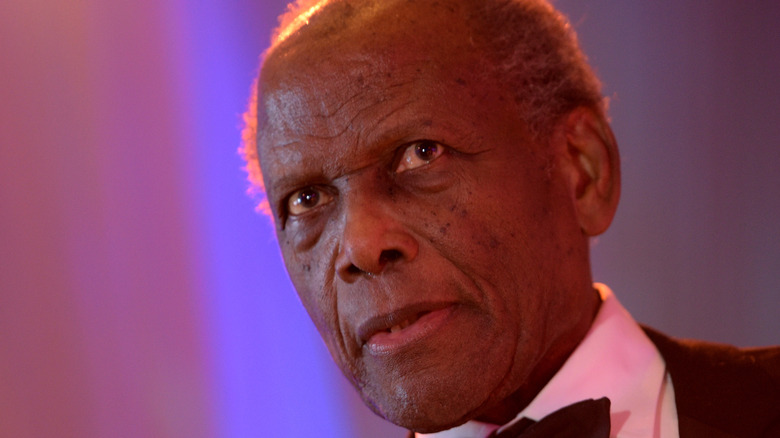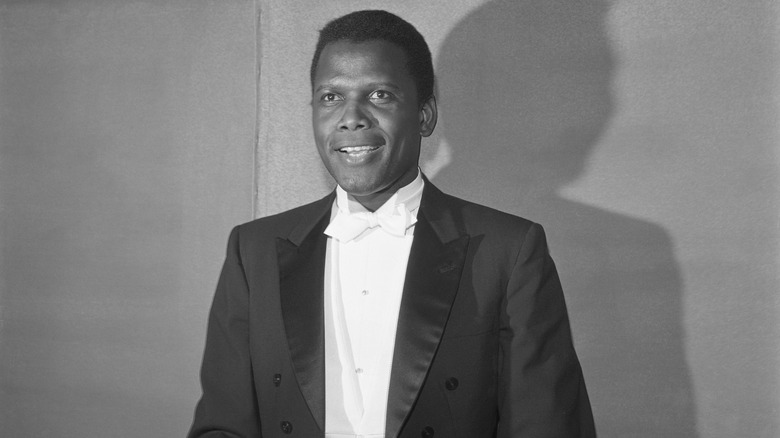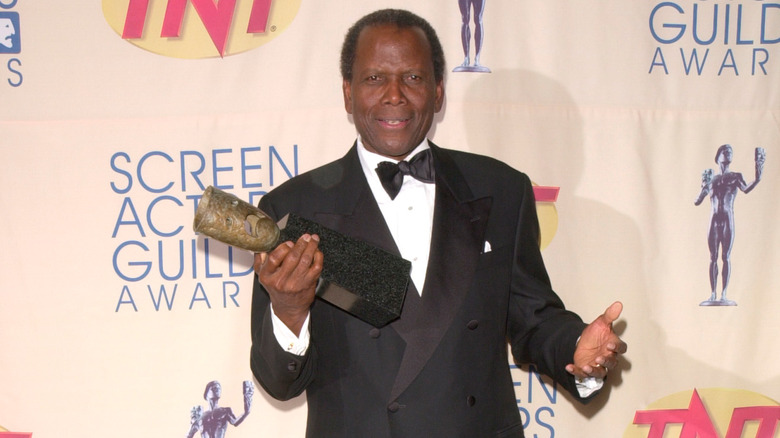The Heart-Wrenching Death Of Sidney Poitier
Legendary and ground-breaking actor Sidney Poitier has died at the age of 94, his family confirmed to NBC. Details on how the legendary actor died were not known at the time of this publication. Thought by many to be one of the greatest actors of all time, Poitier made history in 1964 when he became the first Black man to win the Academy Award for Best Actor for his role in "Lillies of the Field."
Tributes rolled in rapidly the morning of January 7, 2022, as the news of his death broke. For example, actor Jeffrey Wright wrote on Twitter, "Sidney Poitier. What a landmark actor. One of a kind. What a beautiful, gracious, warm, genuinely regal man. RIP, Sir. With love."
Sidney Poitier will remain a legend
Sidney Poitier became the first African-American matinee idol and went on to make movies throughout the '60s and '70s that discussed race in ways that films had never done before. As written in Variety, he portrayed three-dimensional, compelling characters that people wanted to know better, characters that were often seen and admired by white people who had never met a Black person at all and certainly hadn't been exposed to the work of a Black movie star.
Poitier was also a film director and well known for his humanitarian work. In 1974, he was made an honorary Knight Commander of the Order of the British Empire. He was awarded the Presidential Medal of Freedom in 2009 and received the BAFTA Fellowship, the Golden Globe Cecil B. DeMille Award, the Screen Actors Guild Life Achievement Award, and an Academy Honorary Award.
From a Bahamian tomato farm to Broadway to Hollywood
Sidney Poitier was born February 20, 1927, in Miami, Florida, arriving two months early while his Bahamian parents were on vacation. He grew up on his father's tomato farm on Cat Island until he was 10, at which point the family moved to the city of Nassau, per Biography. After young Poitier started getting in trouble on a regular basis, his parents sent him to live with his older brother in Miami. When he was 16, he moved to New York City on his own and started taking acting lessons at the American Nego Theater, which he traded for performing janitorial work.
He eventually began appearing in stage productions, at first serving as Harry Belefonte's understudy in "Days of Our Youth." He made his Broadway debut in 1946 in a production of "Lysistrata" and toured the country with an all-Black cast performing "Anna Lucasta."
In 1950, he made his Hollywood debut with a small role in "No Way Out." In 1955 he broke through with a role as a gifted but troubled high school student in "Blackboard Jungle." He received his first Oscar nomination in 1958 for "The Defiant Ones," making him the first Black person to receive an Academy Award nomination for Best Actor and followed up with his first lead role as Porgy in "Porgy and Bess" opposite Dorothy Dandridge. Another star turn in the 1961 film adaptation of "A Raisin In The Sun" made him even more famous.
A ground-breaking, stereotype-shattering career
In 1964, Poitier made history when he became the first Black man to win the Best Actor Academy Award for his role in "Lilies of the Field." In 1967, Poitier had a banner year, playing three different ground-breaking roles during a time that the American civil rights movement was in full swing and race relations were playing out on screens both via the news and via films. Per Biography, in "In The Heat of the Night," he played Philadelphia Detective Virgil Tibbs, who travels to Mississippi to investigate a murder. In one scene, a racist white suspect slaps Detective Tibbs for questioning him and Tibbs slaps him back. The scene remains famous and, per the Directors Guild of America Quarterly, is known as "the slap heard 'round the world."
In "Guess Who's Coming To Dinner?", Poitier played opposite screen legends Katharine Hepburn and Spencer Tracy as Dr. John Prentice, a Black man brought home to meet the parents of his white fiancee. Interracial marriage was still illegal in 17 states until June 12, 1967, according to Constitution Daily, just six months before the film was released and was rarely portrayed in a positive light in any popular culture. Finally, in "To Sir With Love," Poitier played teacher John Thackery, a Guyanese immigrant teaching in a multiracial, inner-city London high school who wins over his unruly students with tough love and an open, conversational classroom.
'To walk through life as my own man'
In a 2000 interview with Oprah Winfrey for O magazine, when Winfrey asked about Poitier's early years in Hollywood, he replied, "It was difficult. [Black actors] were so new in Hollywood. There was almost no frame of reference for us except as stereotypical, one-dimensional characters." When Winfrey pointed out that he had refused to play those sorts of roles, Poitier said, "Not only was I not going to do that, but I had in mind what was expected of me — not just what other Blacks expected but what my mother and father expected. And what I expected of myself ... To walk through my life as my own man."
Poitier made many more films until his 1997 retirement, including playing Virgil Tibbs twice more in two "In The Heat of the Night" sequels, directed nine movies, wrote three autobiographical books, and served as ambassador of the Bahamas to Japan and UNESCO. When he won the Academy Honorary Award at the 2002 Oscars for his service to American cinema, Denzel Washington became the second Black Best Actor winner in history at the same ceremony. He honored Poitier in his acceptance speech, saying, "I'll always be chasing you, Sidney. I'll always be following in your footsteps. There's nothing I would rather do, sir," per American Rhetoric.
Sidney Poitier is survived by his wife Joanna Shimkus, his daughters Beverly, Pamela, Sherri, Annika, and Sydney Tamiia, eight grandchildren, and three great-grandchildren. He was preceded in death by his daughter, Gina.




